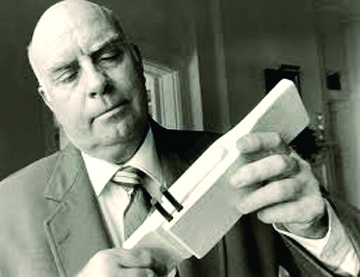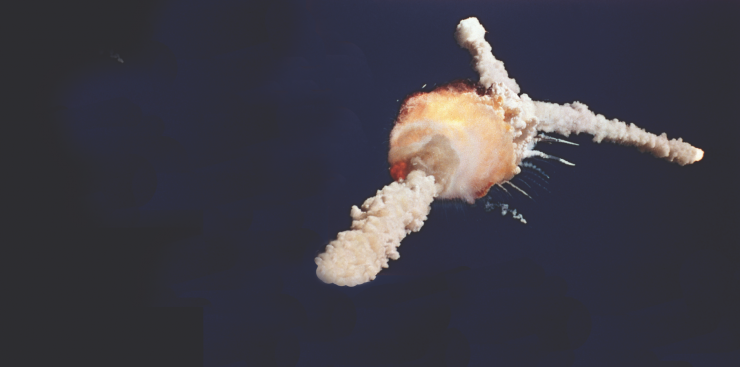Those who encounter wrongdoing face tough ethical choices. Does social responsibility trump personal uncertainty?
It almost sounds like an essay prompt to teaching ethics, particularly to those planning in an ethics class: As an employee, you are privy to information of public significance about which you feel your employer is not being honest. Do you remain silent? Or do you speak out, inviting dismissal, possible criminal or civil action, and the scorn of your peers — or, conversely, public gratitude?
What do you do?

It’s not an easy question, nor an academic exercise, as people from Edward Snowden and Bradley Manning to Roger Boisjoly and Daniel Ellsberg can attest. And the right decision is not necessarily the clear, nor unanimously supported, one. Whistle-blowers often are ostracized and face worksite retaliation, from transfers to demotions to dismissal. Some — especially those dealing in government secrets — face arrest.
Time magazine explored the issue in June in an article headlined “Geeks Who Leak,” examining the “hackermentality” embrace of a philosophy “that information wants to be free, that privacy is sacred and that he has a responsibility to defend both ideas.” While that would seem to skew to a younger generation, and ethos, a 2011 study by the business-funded Ethics Resource Center suggests an unexpected generational divide in approaches to whistle-blowing, with older workers more likely to go outside their institution to correct a perceived wrong than would younger workers.
All of this creates challenges when it comes to enter the business world, and in establishing a moral foundation for understanding motives, costs and the repercussions of what some might consider to be acts of disloyalty.
“It is very important for students to understand that many times the wrongdoings in society are exposed by people who are on the inside — who actually see what’s going on,” says John Stupar, a former aerospace engineering project manager who teaches courses in business and engineering communications and ethics at Chapman University. “They really have a social responsibility to reveal the misconduct, especially if it’s affecting the health, safety and welfare of society.”
ALTERING HISTORY
Chapman philosophy professor Mike W. Martin, Ph.D., believes that “most professionals confront whistle- blowing decisions at some time in their career. Hence students need to be prepared in advance about how to handle them.”
In fact, whistle-blowers have had a significant impact on public awareness of governmental and private-sector wrongdoing, and at times have altered the course of the nation’s trajectory. Public support for the Vietnam War, for instance, plummeted after Ellsberg, a civilian Pentagon analyst, leaked a confidential Defense Department- written history of the war to the New York Times. The documents revealed that top military officials had lied about casualties and other key elements.
“We were told over and over early in the war that you don’t understand what’s going on; we understand, let us run it,” says Don Will, the Delp-Wilkinson Professor of Peace Studies at Chapman. “One of the things the Pentagon Papers proved is that they didn’t understand what they thought they understood. We learned during that period that you don’t trust the government.”
Whistle-blowers have also revealed wrongdoing by corporations, such as the secretive internal audits conducted in 2002 by Cynthia Cooper and several members of her staff that revealed a $3.8 billion accounting fraud by telecom giant WorldCom, a scandal that eventually led
to bankruptcy for the company and jail time for some of its executives.
Yet whistle-blowing sometimes proves to be tragically ineffective. Boisjoly, whose papers are collected in the Frank Mt. Pleasant Library of Special Collections & Archives at Chapman’s Leatherby Libraries, famously tried to warn his Morton Thiokol bosses and NASA officials that O-rings in the shuttle Challenger booster rockets could fail if the launch-time air temperature was too low. Despite Boisjoly’s warning and near-freezing temperatures in Florida in January 1986, the shuttle launched anyway. Watching on TV, Boisjoly was relieved when the shuttle lifted off without incident, but that turned to horrified agony as the Challenger exploded in the sky just more than a minute later.
“For a long time, I bore the burden of guilt because I hadn’t done more to stop it,” Boisjoly, who died last year, told the Associated Press in 1988. Two years of therapy and public talks about the disaster helped him put the events in a more objective context. “I’ve resolved it now. I did everything I could.”
THE PUBLIC GOOD
The emotional component of whistle- blowing can be significant, and the contours change depending on the nature of the transgression. The decision to out wrongdoing — to tell someone who can take action vs. telling a spouse or friend — can force a whistle-blower to choose between colleagues and the public good.
Stupar argues that the public good should always win out.
“When an employee knows that there is something unethical or illegal going on, it needs to be brought to the attention of the management of that organization,” he says. When management is the problem, or stonewalls the issue, “the employee needs to try to find another avenue.”
Martin, who has written about the practice in several book chapters, as well as the article “Whistleblowing: Professionalism, Personal Life, and Shared Responsibility for Safety in Engineering” (Business and Professional Ethics Journal, vol. 11, 1992), teaches about the issue in his Business and Professional Ethics class. He defines an internal whistleblower as someone who brings a problem to the attention of superiors. An external whistleblower — someone who feels that internal mechanisms for correcting the problem are ineffective or corrupt — turns to someone outside the organization, such as a journalist, a regulator, or law enforcement.
“Whether whistle-blowing is justified in a given instance turns on many contextual factors, especially on the genuineness and seriousness of the moral problem being reported, and on the likely and actual consequences in blowing the whistle,” Martin says. He adds that the repercussions come into play, too, such as “the likely harm to the organization and to the whistleblower, in terms of retaliation. Some whistleblowers are heroic; many do much good; many do great harm.”
In fact, Martin says, “one study of corporate whistle-blowing suggested that about half of whistle-blowing is unjustified and harmful.”
Part of the problem is a sense by employees that their managers would not be receptive to reports of malfeasance, and so they go outside the company to report an issue that could have been handled internally. In a few cases, disgruntled employees seek to damage a company they believe has mistreated them. But in other cases, and for reasons ranging from individual careerism to profits, managers put the company’s interest ahead of public safety and public transparency.
INSIDER TRADING
Self-interest propels other ethical frictions in business, too, such as insider trading, in which company executives make personal investment decisions based on information that other shareholders don’t have. Some, such as libertarian Tibor Machan, who holds the R.C. Hoiles Chair in Business Ethics and Free Enterprise at the Argyros School of Business and Economics, have argued that insiders should be able to act on information they receive through their jobs.
“It may be one’s achievement or good fortune to learn of opportunities ahead of others, and this may not be morally wrong but quite industrious,” Machan wrote in the 2002 textbook A Primer on Business Ethics, with James E. Chesher. “Acting on such information may be prudent and exhibiting good business acumen whenever it does not involve the violation of others’ rights. … Morality may require one to act promptly, ahead of everyone else, so as to make headway financially.”
But that approach has faded into a decidedly minority view in favor of transparency and an ethos of supporting a level playing field for all investors, says Larry Rosenthal, a professor in the Dale E. Fowler School of Law. Rosenthal is a former federal prosecutor in Chicago who specialized in organized crime, public corruption and insider trading cases. Among other issues, inside traders place personal gain ahead of their responsibility to shareholders.
“If the people making corporate policy have an incentive to increase their compensation by making the stock price go up and down a lot, that may be quite inconsistent with long-term corporate welfare,” he says. “We wind up with a system in which insiders get to increase their compensation almost at will while reducing long-term corporate welfare. That’s a pretty significant problem, especially since insider trading doesn’t generate any wealth for anybody; it’s a wealth transfer.”
At the same time, that incentivizes outsiders to offer bribes and kickbacks to achieve that insider information. “People shouldn’t be able to profit over and above the amount of money they are supposed to be paid in salaries. That’s the fair-dealing rationale.”
And because federal authorities don’t “release data on that, for fairly obvious reasons … we don’t really know how often you’ve got a whistle-blower on the inside,” alerting investigators to insider trading. “Whistle-blowing is awfully rare. It’s even rarer when lots of people are making money,” he says.
WIDESPREAD EFFECTS
Though rare, whistle-blowing can still have broad repercussions. Jeffrey Wigand was director of research for Brown & Williamson tobacco company from 1989–93, where he discovered that top corporate officials knew that addictive compounds were being added to the firm’s tobacco, revelations he made public in a 1996 interview with the 60 Minutes TV news program, revelations that led to the landmark Master Settlement Agreement with the tobacco industry that has funneled hundreds of billions of dollars to state health and awareness programs.
But some of the highest-profile cases have revolved around government polices — including the current Manning and Snowden cases, which revealed details
of how the United States was conducting wars in Afghanistan and Iraq, and the extensive data collections swept up by the National Security Agency (Snowden).
Each of those cases is shrouded in political debates that will not be resolved for years, though Manning was recently convicted by a military tribunal on espionage charges. Snowden has been granted a year’s visa by Russia, despite U.S. requests that he be arrested and extradited to face espionage charges. Leaving aside the legalities of what they did, Martin says, both men acted in what has become a modern American tradition that ultimately helps strengthen democracy.
“Even if you disapprove of the specific action … they were really trying to let the public know things,” Will says, adding that Manning, who now identifies as a transgender named Chelsea Manning, revealed “war crimes” by American forces. “He wanted to get it out so that the American people knew what was going on in the war and could make a better-informed judgment as to its pursuit and the morality or immorality of the war.”
Snowden sought to break down walls of secrecy surrounding government activities. “He felt people needed to know what the government was doing,” Will says. And exploring such cases in the classroom, he says, helps students understand “how government can go awry, and how to stop it. And sometimes the stopping it takes a whistle-blower.”
But the whistle-blower needs to be aware of the personal price. While there are some laws in place to protect whistle-blowers, they aren’t a failsafe. Rosenthal points out that there sometimes are stark differences between what one person might consider the right, moral, and ethical thing to do, and the legal thing to do.
“As a lawyer teaching in the law school, I really can only have one perspective on it, which is, you have to obey the law,” Rosenthal says. “But if we believe in democracy, then we have to say that when the legislature resolves a question even in a way we disagree with, we’ve got to tell our clients, you’re obligated to respect that. And if you decide to go break the law, you’ve got to face the consequences.”
And who you cultivate advice from could determine the framework for what a potential whistle-blower ultimately decides.
“You want to have one kind of conversation, talk to your priest,” Rosenthal says. “You want to have another kind of conversation, talk to your lawyer.”





Add comment